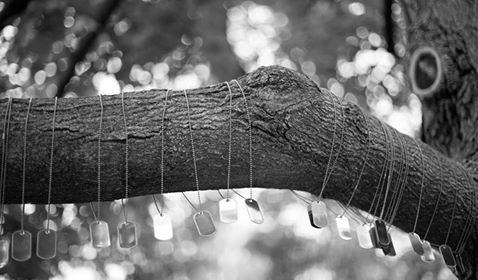On Veterans Day, do more than say thank you
 On Veterans Day, go beyond thanking a veteran for their service.
On Veterans Day, go beyond thanking a veteran for their service.
As Veterans Day is celebrated Wed. Nov. 11, make the effort to learn about the challenges that our veterans face when they return from duty, and make time to fully welcome those service men and women into the life of the United Church of Christ.
“Veterans Day is not simply a day to pray for and thank our veterans and military chaplains,” said the Rev. Mike Neuroth, UCC international policy advocate in the Washington, D.C., office. “It is rather a day to learn more about the challenges veterans face and in new ways find ways to extend, as churches and individuals, compassionate care and healing to veterans in our communities.”
Take the example of St. Andrew’s UCC in Perkasie, Penn., which for the second straight year is displaying a Witting Tree. Each day from Nov. 1 through Nov. 11 at 7:30 a.m. organizers hang 22 dog tags on the tree as a loud, unforgettable reminder of the number of veterans who commit suicide each day, according to statistics from the Department of Veteran Affairs.
“One of the things that’s important to us is that it’s a public witness to people that are suffering and that matter to us,” said the Rev. Scott Hutchinson, pastor of St. Andrew’s.
Roger Kessler, a member of St. Andrew’s and a veteran of the 1990-91 Gulf War in Iraq, said, “To see it, it’s hard to go through the day without considering that 22 veterans take their lives.” Kessler helped come up with the name “Witting Tree,” with the meaning of the word “witting” described as being conscious or aware of the full facts of a situation.
Hutchinson added that veterans can feel isolated when they return from service and that the Witting Tree “acknowledges the issue and acknowledges the wounds,” he said. One of those war wounds is suicide, Hutchinson said, adding that everyone should listen to the stories of veterans.
“There is a communal need for honest acknowledgment of the burdens and wounds of war, careful tending and genuine homecoming. There is also a deep need for our society as a whole to take responsibility to interrupt and transform destructive cycles that cost our service people so much,” Hutchinson said.
In addition to the Witting Tree at St. Andrew’s, there are seven other trees in nearby counties at different churches and organizations – including at St. Peter’s Tohickon UCC in Perkasie.
While a memorial such as the Witting Tree isn’t an immediate solution to the wounds that warriors face, it does raise awareness of the issue — and also raises awareness about the ongoing research happening in the care of veterans. More recently, veterans, researchers, and the Veterans Administration itself, have begun to recognize the moral and spiritual impact of war. The concept of ‘moral injury’ was introduced to define the psychological, emotional, and spiritual trauma that can result from having to make difficult moral choices under extreme conditions, witnessing immoral acts, or behaving in ways that challenge one’s conscience and identity.
It is one of several psychological effects that can result from engaging in combat. Neuroth said that moral injury isn’t limited to those who serve in the military, but it has been “embraced by many veterans as a way of describing the moral and spiritual dissonance they feel in response to experiences in combat.”
In 2013, the UCC took an important first step in recognizing moral injury when the General Synod passed a resolution, “To Recognize the Need for Compassionate Care and Healing to Our Veterans,” brought by a group of churches in Northeast Ohio that were committed to veteran ministries. The resolution calls upon all UCC settings to engage in ministries of welcoming and healing with returning veterans, and identifies the Soul Repair Center in Ft. Worth, Texas, as a resource and partner.
“As a denomination, extending an ‘extravagant welcome’ to all without exceptions is central to our identity. However, extending an extravagant welcome to veterans does not simply mean an open door, but rather offering, with informed intention, a welcome of compassionate care and restorative healing,” Neuroth said. “It would mean a welcome that is cognizant of the wounds some carry as a result of their military service.”
Related News
A Prophetic Call for Justice and Peace in Palestine
The executive leaders of the United Church of Christ have issued the following statement...
Read More‘Love is Greater Than Fear’: Regional Youth Events get to the heart of gospel message
United Church of Christ teens attending this summer’s Regional Youth Events (RYE) are...
Read MoreUCC desk calendars available to order now
Prepare for your day, month and year with the United Church of Christ desk calendar —...
Read More


